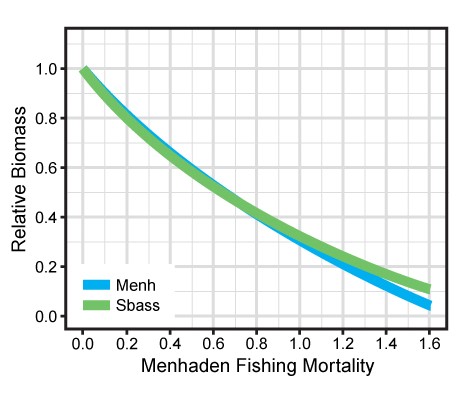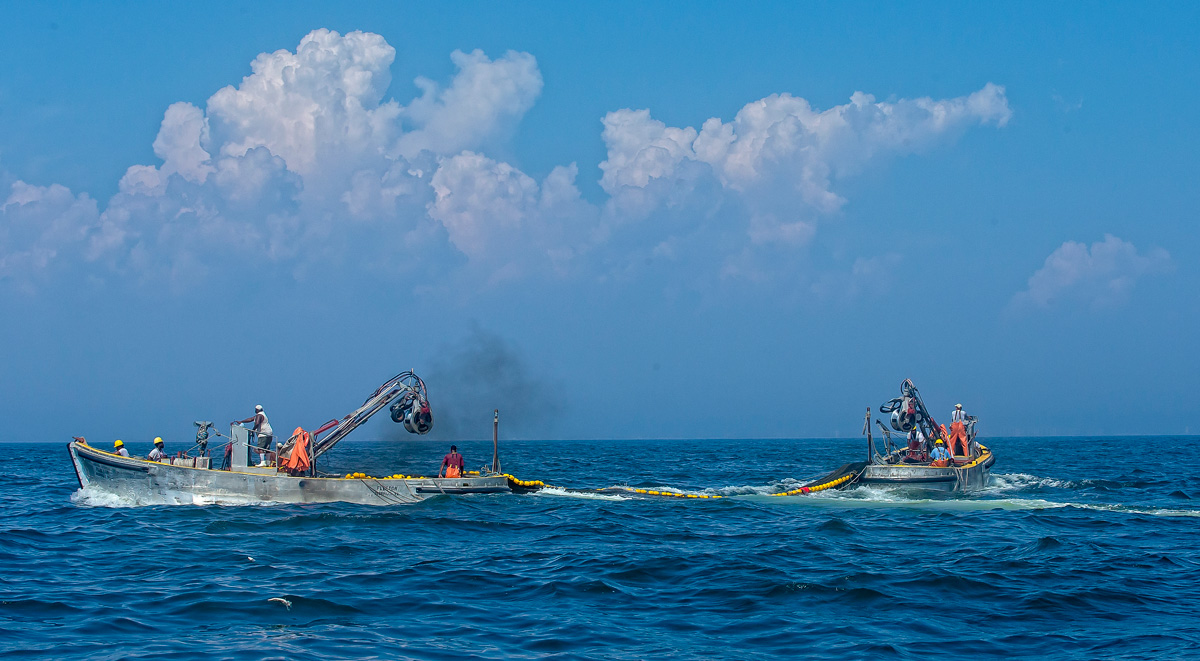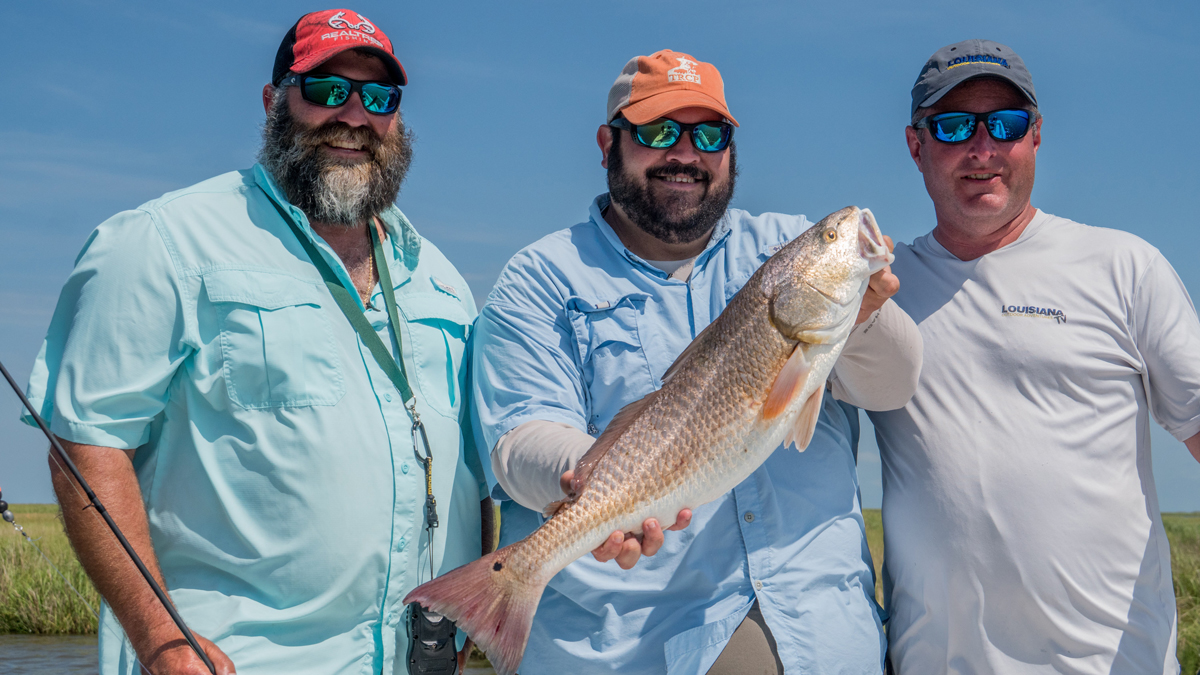Conservationists fear that the fox could end up guarding the henhouse in menhaden certification process
In a biting piece of satire in the May 2019 issue of Sport Fishing Magazine, editor Doug Olander took aim at Omega Protein’s efforts to have its industrial harvest of menhaden certified as a sustainable fishery by the Marine Stewardship Council. The company apparently took issue with Mr. Olander’s characterization of the process as Omega “buying its way to respectability” and looking to “wrap itself in a cloak of respectability by claiming it’s a certified sustainable fishery.”
Omega Protein stated in its media response:
“Mr. Olander isn’t just wrong about the independence and integrity of the MSC process; he gets key facts wrong about the fishery, making wild, misleading claims. He blames the ‘industrial menhaden-reduction fishery’ for current problems facing striped bass. But this ignores all of the available evidence. According to the ASMFC, striped bass are overfished, and overfishing of the species by recreational anglers has been cited as the main cause, the same anglers which are Mr. Olander’s primary audience. The issues facing striped bass are due to overfishing.”
Omega’s eagerness to silence critics and divert attention to anything other than its own operations for the problems in the striped bass fishery is nothing new. The menhaden reduction fishery is a true relic of the past and one of the most reviled in the entire country. Using spotter planes and a purse seine fleet to encircle and remove entire schools of menhaden, Omega catches millions of pounds of one of the most important sources of forage along the Atlantic Coast every year, and reduces them to fish oil pills and feed for aquaculture operations, among other things.
Anglers in the region have long believed the company’s relentless pressure on menhaden in the Chesapeake Bay, the primary nursery ground for striped bass and many other sportfish, has caused localized depletions of forage, leading to an increase in diseased, stressed, and skinny fish in the Bay.

Striped bass are indeed experiencing overfishing, and anglers are acting to reverse that trend by working with managers to reduce limits and curb catch-and-release mortality. But a prolonged period of low striped bass spawning success is a large part of the problem.
That may very well be tied to inadequate forage in the Bay, no matter how much Omega would like to protest otherwise. In fact, the best available evidence is that the reduction fishery may be driving a nearly 30-percent reduction in striped bass.
Mr. Olander is certainly not alone in questioning the Marine Stewardship Council and its practices. In the past, the MSC has been funded in part from royalties paid by seafood processors using the MSC ecolabel.
Third-party certifiers are paid by the entity seeking certification, and if the certification is successful, those third-party certifiers often receive long-term contracts to monitor chain-of-custody of the products and update reviews of the fishery every five years. In other words, both the MSC and the independent reviewers stand to benefit financially from a successful certification.
In 2011, the science journal NATURE published a sharp critique of the MSC process, claiming that after the signing of a contract between the MSC and Wal-Mart, the number of certified seafood products skyrocketed. One of the fisheries that qualified for possible certification around that time was the U.S. Southeast Coast swordfish and big eye/yellowfin tuna fisheries.
At the time, Billfish Foundation President Ellen Peel remarked, “It is inconceivable that the MSC could grant approval to longline gear that causes 90 percent of the mortality on marlins, spearfish, and sailfish bycatch across the Atlantic.”

Even today, when entities formally object to a certification—as Coastal Conservation Association, the American Sportfishing Association, the Theodore Roosevelt Conservation Partnership, the Nature Conservancy and the Chesapeake Bay Foundation are currently doing with Omega’s menhaden certification—an independent adjudicator decides whether they have “a reasonable prospect of success.” If so, the objectors are then required to pay a roughly $6,000 “objection fee” to proceed.
It is easy to get the feeling that the MSC process is less about sustainability and more about whose pockets are deep enough.
In January 2019, the state of Virginia formally notified the MSC of its opposition to certification of the menhaden fishery. In April 2019, New York Governor Andrew Cuomo signed legislation to protect menhaden in New York’s waters by prohibiting harvest by purse seine, essentially rejecting the industrial harvest of menhaden.
These two states, along with conservation groups and tens of thousands of concerned anglers, all share the same deep-rooted concerns that management efforts to date have failed to account for the menhaden’s critical ecological role in the Atlantic coastal ecosystem. There are huge unknowns about the bycatch associated with Omega’s menhaden harvest, and while Omega claims menhaden aren’t overfished, the amount of menhaden needed for the ecosystem is still being investigated by a dedicated team of assessment scientists expected to be concluded at the end of this year.
So, it remains unclear why MSC would certify the fishery now instead of waiting for the results of this assessment.
Mr. Olander is correct to question whether the fox is guarding the henhouse when it comes to MSC certification of Omega’s industrial menhaden fishery. The company’s aggressive tactics to silence critics, like Olander, should only serve as a warning that more light needs to be cast on this entire process.
The preceding editorial is submitted by the Coastal Conservation Association, American Sportfishing Association, and Theodore Roosevelt Conservation Partnership.







Menhaden are a keystone species, filter feeding clarifies the water allowing sunlight to reach eelgrass beds and promote scallop and juvenile fish habitats…. and are a huge source of food not just for bass but many predators … bluefish, weakfish, fluke and including whales….!! This same protein can be naturally derived from other sources …,! No need to slaughter menhaden …!
Purse seining should be banned everywhere. Not only does it sweep the area clean of the target fish, but the bycatch includes so many other sea creatures that are endangered.
Follow the money.
I am a fly fisherman from New Hampshire. We fish for Stripe Bass along our harbors and estuaries. It all barbless hook and catch and release. It a multi-million sportfishing industry. The loss to the tourist business if Stripe Bass were to disappear would be terrible.
I was a Research Fisheries Biologist studying the migrations and population dynamics of Atlantic and Gulf menhaden from 1967 to 1974. These fisheries had been over-fished since the end of WW II and the use of aerial spotter planes to find the menhaden schools and guide the setting of the purse seines. At the time, the gigantic 1958 Atlantic Menhaden year class carried the steady expansion of the fisheries through about 1963. After that, the over-developed fisheries (too many boats and processing plants) led to the steady decline of the catch, even with increased effort. Unfortunately, there were no sport fishing and conservation groups acting on behalf of the menhaden at that time. KEEP UP THE GOOD WORK!
Limit commercial catch by regulations
The only explanation that can be gained from all the facts is that this is about money only.
Thank you for bringing this conservation issue to light, so many non-coastal sportsman don’t here about “ industrial fishing” , and unfortunately are not supporting due to ignorance, and I am one who was until now. This needs a clear eyes view by biologist in the marine field and sent in a report to Dept of interior , and USFW as well.
Watch the video. There are not many left after nets are hauled in. Real bad,all about $.
After Perry Duryea’s (sp??), seafood butchershops out on East End L.I. ceased operations, the striper fishery rebounded. Now the “Bunker Boats” are out (well, they’ve always been there), are trying to do to this important East Coast fishery, what the netters did to the Florida baitfish ( and ultimately the sportfishing business) in the 90’s until they were stopped by Florida.s net ban. Why do these guys think that everything that swims belongs to them???
Why we continue to allow our bait fish to be over fished is unknown to me. Herring in Alaska where I live is harvested heavily and we wonder why our salmon and whales etc. are having problems. Same with sardines in other parts of the world.
The mathematical model estimating spawning mass and used to set menhaden catch quotas is easily manipulated by Federal employees working for ASMFS and NMFS. Several high level career menhaden science managers later went on to work for Omega and its associates .
Perhaps two or three of the ASMFC “ Commissioners” voting on catch limits understand the mathematical model. There are no naturalists, ecologists or marine biologists in the peer review pool. The consists of applied statistician only. I doubt some of them have ever seen a menhaden in the water. The total allowable catch should be reduced by half to maintain our predators reliant on menhaden for reproductive successes . The peer reviewers have to go and people who are out on the resources should be critiquing the results of the model . 150k comments to ASMFC asking them to significantly reduce catch ignored again . This is laughable.
I am the person that uncovered all the deceit by the federal fisheries commissions. The computer man for the Gulf States Marine Fisheries Commission resides in my home town, Ocean Springs. He knew I would never give up so he invited me into the federal computer to see the truth. The truth is Omega Protein has supplied all the “So Called” Science for the entire industry for forty years. I was also at the original meetings with MSC so called certification group. 3 men from Ireland that do not go on boats, do not take in account bi-catch, do not take in account of mammals killed or collateral damage to the 100 other species that depend on menhaden for essential nutrition. The whole industry is rigged from the Department of Commerce down. And the information flow is from Omega Protein Scientist to GSMFC to ASMFC o NOAA> DEPT of Commerce. We have all been lied to and the damage to the National Fishery is irreparable and catastrophic with collateral damage to 100 plus species. The menhaden industry must be shut down and all of the culprits sent to jail.
The list of crimes committed by Omega Protein and its employees are. 1-Breaking “Jones Act” the fabric of maritime law to protect US Citizens. Omega Protein is now owned by a Candian Company Cooke Inc out of Brunswick Canada. It is illegal for a foreign entity to own American Flag Vessels and create commerce in US waters. 2. Breaking the Clean Water Act on many occasions, polluting the same water they fish. 3.-Gross Sientific Malpractice by using science as a tool against all of us. 4-Gross mis-management of Natural Resourcesby killing 2 billion pounds of fish and mammals. 5-Breaking the Marine Mammal Act by killing dolphin as bi-catch.
Omega needs to be shutdown completely and virginia needs to follow the lead of every other east coast state. The bay will thrive if Menhaden come all the way up the bay unabated, shut them down now.
Omega ( under the new Boat Company Name( Alpha Vessel Co ) is currently being sued in Mississippi for events resulting from OSHA and Clean Water Act violations. They have already admitted the OSHA violations other Violations By Alpha are pending.
300 million pounds out of the Mississippi Sound, with 5-10 percent bi-catch. The Gulf States Marine Fishery Commission is in Ocean Springs, MS, 15 miles from the Omega Protein plant. I went there and spoke with an employee that let me look into the computer and see that they have 40 years of falsified science. Omega Protein Scientist provide all of the information on stock, and sustainability. The Omega Protein and Daybrook Fishery sit as chairs on the board. They are called the menhaden reduction industry. This is what they were set out to do by the Department of Commerce, and NOAA. It was never about conservation. It has always been on taking as much as you can from any source. SHUT OMEGA DOWN!